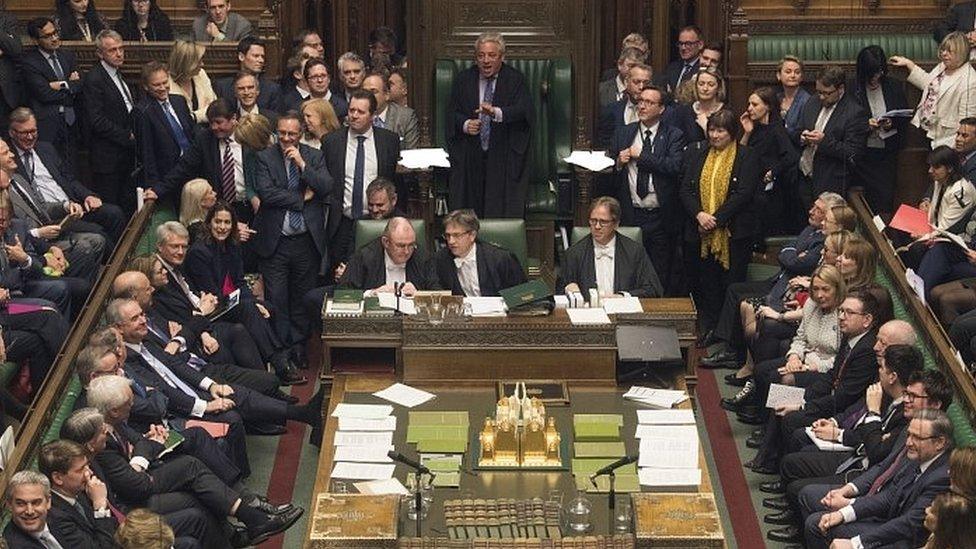Unhappiness with politics 'at 15-year high'
- Published

Politicians are now less trusted to act in the public interest than bankers
The public's dissatisfaction with how government is working is at a 15-year high, an influential study of political engagement suggests.
Levels of unhappiness are now greater than in the wake of the MPs' expenses scandal, the Hansard Society found.
More than half of the 1,200 people questioned thought the UK was in decline and needed a "strong leader who is willing to break the rules".
And more than 40% said they could support new parties with radical ideas.
was carried out in early December, before the extent of the current Commons deadlock over Brexit became apparent.
But it found that MPs were less trusted to handle Brexit than judges and civil servants, while banks were more trusted to act in the public interest than MPs, ministers or political parties.
The survey of 1,198 adults, carried out by Ipsos-Mori, found falling levels of confidence in the political system and the belief that the public can influence decision-making and change the country for the better.
'Room for improvement'
The proportion of respondents who believed the system of government required either "quite a lot" or a "great deal" of improvement rose above 70% for the first time - to 72%.
This was 12 points higher than when the annual research first took place in 2004 and three points higher than in 2010 - when it hit 69% in the aftermath of the furore over MPs' expenses claims.
Institutions and individuals both came in for their share of blame.
Nearly 40% of respondents agreed that "neither the system nor the people making the decisions" were good enough, as opposed to 15% who said the people in power were good but the "system prevents them from making the right decisions".
On Brexit, 79% of respondents had little or no confidence in political parties' ability to sort it out, while 75% said they were too divided to act in the national interest.
Confidence levels in civil servants and judges were higher, at 40% and 49% respectively, than for individual MPs (25%) and ministers (26%).
'Important questions'
While one in three of those questioned still considered themselves to be a "fairly or very strong" supporter of an established political party, 43% said they would consider backing parties with radical ideas which had not been in power before.
Some 54% said they agreed that the UK needed "a strong leader willing to break the rules" - against 23% who disagreed.
And 42% of respondents said they believed many of the UK's problems could be dealt with more effectively if the government did not have to worry so much about votes in Parliament.
While support for referendums to solve big political questions has declined sharply since 2016, 55% of those questioned still had faith in them as opposed to 39% who did not.
Ruth Fox, director of the Hansard Society, said the findings raised "some pretty important questions about how people feel about our democracy at the moment".
"We are seeing some anti-democratic sentiments coming through, through the frustration that the public have got with the politicians and the parties," she told the “óĻó“«Ć½'s Politics Live.
On a more positive note, she said core indicators of engagement - such as certainty to vote and interest and knowledge of politics - remained stable at average or above-average levels compared with previous years.
The survey found 80% of those who voted Remain in the 2016 referendum were "absolutely certain" to vote again in a future referendum or election, compared with 64% of Leave voters.